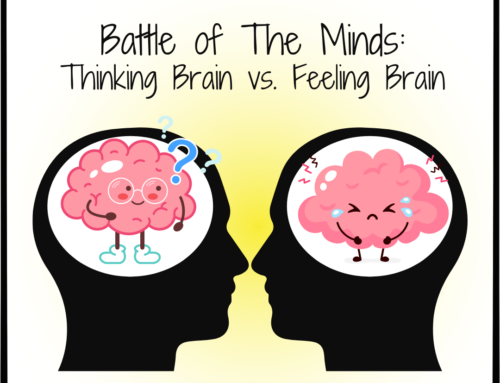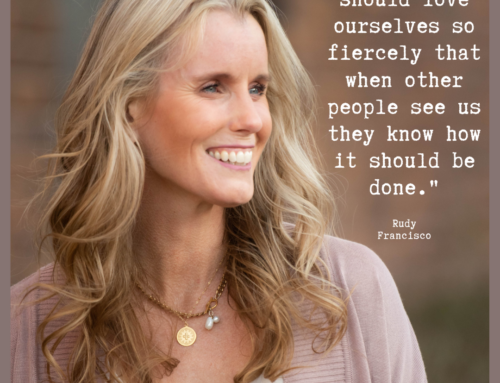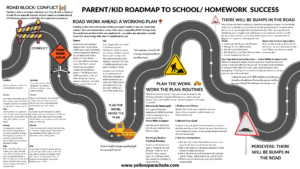Where would we be without the incredible research and life-giving language of Brené Brown and Ann Voskamp?
Well, for a start, the story I could have/would have made up last week is that our dog friends think Allie is a terrible a dog with a terrible owner (me) and that everybody whispers about how awful we are behind our backs. These are the lies of shame gremlins thumping their familiar, catchy bass-line of “not good enough.” Can you feel it?
And what happens when we allow Shame to slink (and thump) around? His friend Blame shows up to keep him company and knock us further from the truth. In moments I felt my worst shame, I would have found a way to armor-up and blame someone else for my hurt. Watch: That guy never should have had his dogs that close to the fence when Allie was coming in. How could he be so dumb? What a jerk! And then he blames me for his stupidity? How dare he yell at me! Who does he think he is, towering over me and screaming in my face? How can everyone just avoid us? Well, we don’t need them anyway. And just like that, I’ve turned my shame into blame, and I’m a knight riding the high-horse of self-righteousness.
And while busy riding and blaming and riding and blaming, I’d miss every chance to heal.
Because in armoring up, I wouldn’t have let it go. I would have kept reliving that crumpled, sad experience, all the while getting mad at people who reminded me of the man who yelled at me or getting worried every time we arrived at the dog park (if I even dared go back). Connecting dots that don’t even exist to confirm a lie told honestly, dooming myself to mistrust and loneliness, mistaking them for toughness. Because shame tells us that if we’re not heroes then we’re villains; either I’m bad, or everybody else is.
Do you see how we cultivate our pain, helping it thrive and loom large, letting it cast shadows and blot out the truth? How heartbreaking. How normal. We all do it. Armor keeps shame in and people out, lies in and truth out. Brené Brown wrote in The Gifts Of Imperfection, “The dark does not destroy the light; it defines it. It’s our fear of the dark that casts our joy into the shadows.”
Maybe I wouldn’t have gone to quite that extreme about the dog park, but I hope you can see the point. Without grounding in the knowledge that I am not my misfortunes or mistakes, I would have missed out on learning. That scuffle at the dog park was an opportunity to see my part in how things went wrong, forgive myself (and that angry dude), and grow. And I (we) have grown. Watch: Now I ask for space at the entrance if Allie’s really excited and, of course, the other dog owners oblige. We run first before we play, and then we’re perfectly polite! No snapping, no growling. How cool is that? Allie and I learned and grew from a terrible, horrible, no good, very bad day. We owned our story and rose again! Humans are wired to learn and connect and we can’t let shame and the wrong connections blind us from our purpose.
The lovely truth? We can all participate in the happy ending. When we understand that inventing painful stories to explain painful feelings is a universal human reflex, and we can rewrite those stories. We can stop and get curious about our racing pulses, our queasy bellies, our sudden anger or fear.
When we notice a conspiracy theory brewing, we use the phrase “Hey, I’m making up this story right now.” This simple but effective phrase gives the opportunity to stop miscommunication, hurt feelings, anger, mistrust—the negative feelings that come when fear fills in the gaps. It stops the thought-bolt before we run away to Canada and put on armor to self-protect from stories that aren’t even true. And it also tells it like it is: my human self is trying to understand something about which I don’t have enough information. Can you help me with this?
For example, after the disappointing dog park visit with Allie, I could come home and say to my family, “Oh guys, whew. It was a tough day at the dog park. I felt terrible so I started making up the story that our dog friends don’t like us anymore. A guy yelled at me and I started to come up with reasons why he was right to do that—that I’m a clueless dog owner and I should never ever go back to the dog park. Can you help me out of this?”
We can say to our friend, “Hey, you were quiet at lunch and my mind is telling a story that you’re mad at me because I was late.” And give her the chance to answer, “I’m not mad at all. Carynne ran a fever and I’m exhausted from running to check on her and cool her off all night.” Or maybe she’d say “Oh, thanks for checking in. I’m having a stressful day, so when you were late my mind started telling a story that no one cares about my feelings.” Then you both have the chance to connect over what is real—your friendship and care for each other—rather than stewing and worrying over what isn’t.
The “I’m making this up” conversation becomes our key to unlocking the stories before they break out and run wild, and our key to disarming before we armor-up and lock out the world. It’s also the key to supporting ourselves, our friends, and our true and wonderful authentic identities in the process. When we can express what we’re truly thinking in all our vulnerability and fear, we get to express who we truly are. We get to be all in. Isn’t that joyfully freeing? We can show up the way we want to, we know we gave our best, and it was enough. It gives us faith and hope to keep trying in becoming who we’re meant to be.
-Cara







